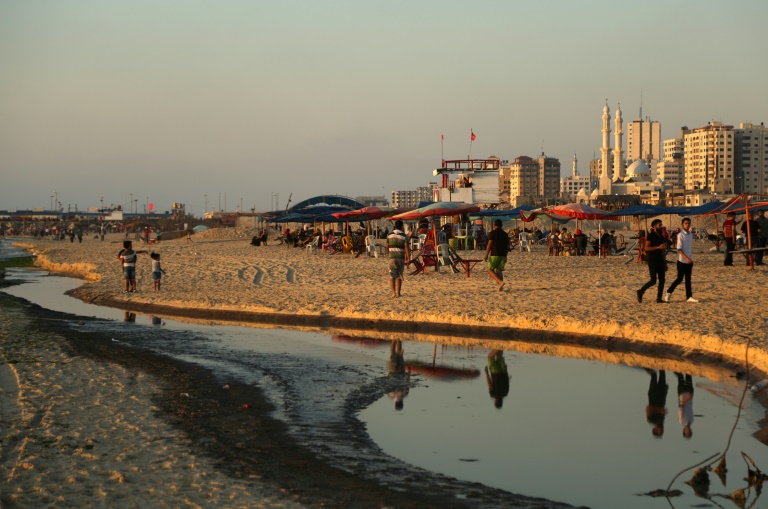Cheers … in more ways than one
Mohammed al-Sayis, five, died late last month a few days after swimming in the sewage-polluted waters, with his brothers also hospitalised, his family and health ministry said.
Dozens of others have been treated after swimming along the strip’s filthy Mediterranean coastline in the past two months, a ministry spokesman in Gaza said.
Pollution in Gaza is not a new phenomena — a decade of a crippling Israeli blockade, coupled with three devastating wars with the Jewish state since 2008, have left infrastructure falling apart.
But the worsening spat between the two leading Palestinian political blocs has exacerbated an already grim situation for the two million residents of the impoverished and densely-populated Gaza Strip.
The Palestinian Authority in the West Bank has sought to squeeze the Islamist group Hamas which controls Gaza.
In April, it reduced the amount of electricity they buy from Israel for Gaza, where the enclave’s sole power plant is barely operational.
The electricity shortage is so severe that all of Gaza’s sewage treatment facilities have ground to a halt in recent months, according to Al-Mezan Center for Human Rights.
As a result, sewage that was previously cleaned and pumped further out into the sea is being released along the coast untreated.
At least 100,000 cubic metres (3.5 million cubic feet) of sewage is being pumped into the sea each day, according to the United Nations, which says more than two-thirds of the coastline is polluted.
The UN has previously estimated the whole of Gaza will be uninhabitable by 2020, but a recent report has said that catastrophe is likely to come sooner.
Ahmed Halas, an official in the environment agency, told AFP all of Gaza’s beaches are polluted to varying degrees and the health ministry advises against swimming altogether.
It has also spread beyond Gaza — last month a beach in southern Israel was temporarily closed after sewage from Gaza washed upstream.
– ‘Our only outlet’ –
While the electricity crisis has caused the pollution that has ruined the beaches, it has also driven Gazans to take to the seaside as an escape.

Gaza’s electricity shortage is so severe that all of its sewage treatment facilities have ground to a halt in recent months, with sewage now being released along the coast untreated
The enclave’s borders with Israel and Egypt are all but sealed, but it has a 40-kilometre (25-mile) coastline stretching the length of the strip along the Mediterranean.
On the edge of a desert, temperatures can reach over 35 degrees Celsius (95 Fahrenheit) in summer months.
Long, power-free summer days in sweltering heat have seen children off school for the holidays nag their parents to go to the beach, tantalisingly close anywhere in tiny Gaza.
There are few public pools to cool down, while many houses have little water.
Around 95 percent of Gaza’s groundwater is unsuitable for human consumption.
Yasser al-Shanti, head of the water authority in Gaza, told AFP that Gaza needed an extra 120 million litres (27 million gallons) of water a year.
Those who can afford it pay to keep their families cool.
“The water in the house is unsuitable for drinking or showering. The sea water is polluted and mixed with sewage,” said Humam, 34, as he poured water on his four children from a filtered water truck.
But the poorest in the enclave have no option.
On Gaza’s beaches, hundreds of children still play in the sea on an average day, with thousands flocking there on Fridays, the Muslim day of rest.
Mohammed al-Sayis went swimming with his siblings in Sheikh Ijlin in southern Gaza after pressuring their father Ahmed to give them a breather from the summer heat.
“It’s hot and humid and there is no power, water or fans in the house,” said his devastated father Ahmed. “The sea is our only outlet.”
The children played in the water for several hours, but they soon showed signs of sickness.
“When we returned home in the evening, I noticed that Mohammed and his brothers were very ill and their condition quickly deteriorated,” he said.
The children were rushed to hospital but Mohammed died 10 days later, while the others eventually recovered.
According to the health ministry, his death was caused by poison ingested during the swim.
Access to the top content, vouchers and other member only benefits